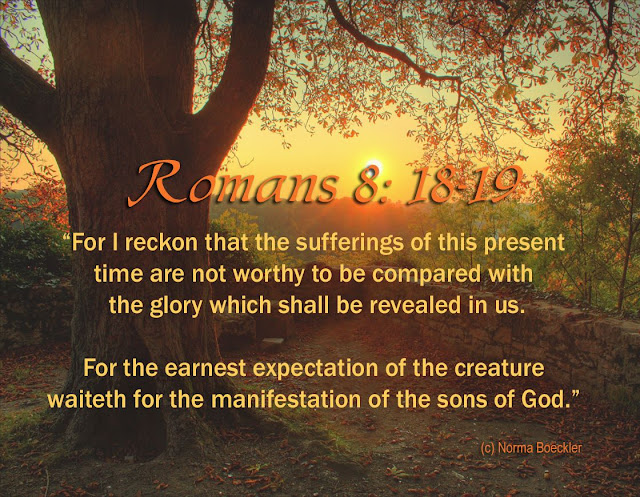22. This is the explanation of Paul’s remarkable declaration concerning the “earnest expectation of the creation.” The creature continually regards the end of service, and freedom from slavery to the ungodly. This event will not take place before the revealing of the sons of God; therefore the earnestly expectant creation desires that revelation to come without delay, at any moment. Until such manifestation the world will not consider godly souls as children of the Father, but as children of the devil. So it boldly abuses and slanders, persecutes and puts to death, God’s beloved children, thinking it thereby does God service. In consequence the whole creation cries: “Oh, for a speedy end of this calamity, and the dawning of glory for the children of God!”
23. We have plain authority for the interpretation of the groaning of creation in Paul’s further words, “the creation was subjected to vanity, not of its own will.” He thus makes all creation — sun and moon, fire, air, water, heaven and earth with all they contain — merely poor, captive servants. And whom do they serve? Not our Lord God; not for the most part his children, for they are a minority among those ministered unto. To whom, then, is their service given? To the wicked — to vanity. The created things are not, as they would be, in righteous service. The sun, for instance, would choose to shine for Paul, Peter and other godly ones. It begrudges to wicked characters like Judas, Pilate, Herod, Annas and Caiaphas the least ray of light; for it is useless service, yielding no good. To serve Peter and Paul would be productive of pleasure and profit; well may its benefit be bestowed upon these godly ones. But the sun must shine as well for the wicked as for the ungodly. Indeed, where it fittingly serves one godly individual, thousands abuse its service.
The case is similar with gold and other minerals, and with all the articles of food, drink and clothing. To whom do these minister? Wicked desperadoes, who in return blaspheme and dishonor God, condemn his holy Gospel and murder his Christians. This is wasted service.
24. So Paul says, “The creature was made subject to vanity;” it must render service against its consent, having no pleasure therein. The sun does not shine for the purpose of lighting a highway robber to murder. It would light him in godly deeds and errands of mercy; but since he follows not these things the service of the blessed sun is abused and that creature ministers with sincere unwillingness. But how is it to avoid service?
A wicked tyrant, a shameful harlot, may wear gold ornaments. Is the gold responsible for its use? It is the good creature of the Lord our God and fitted to serve righteous people. But the precious product must submit to accommodating the wicked world against it will. Yet it endures in hope of an end of such service — such slavery. Therein it obeys God. God has imposed the obligation, that man may know him as a merciful God and Father, who, as Christ teaches ( Matthew 5:45), makes his sun to rise on the evil and the good. For the Father’s sake the blessed sun serves wickedness, performing its service and bestowing its favors in vain. But God in his own good time will reckon with those who abuse the glorious sunlight and other creatures, and will richly recompense the created things for their service.
25. Beloved, Paul thus traces the holy cross among all creatures; heaven and earth and all they contain suffer with us. So we must not complain and excessively grieve when we fare ill. We must patiently wait for the redemption of our bodies and for the glory which is to be revealed in us; especially when we know that all creatures groan in anguish, like a woman in travail, longing for the revealing of the sons of God. For then shall begin their redemption, when they shall not be slaves to wickedness but shall willingly and with delight serve God’s children only. In the meantime they bear the cross for the sake of God, who has subjected them in hope. Thus we are assured that captivity will not endure forever, but a time must come when the creatures will be delivered. “Do ye likewise, beloved Christians,” Paul would advise, “and reflect that as the creature will rejoice with you on the last day, so does it now mourn with you; that not you alone must suffer, but the whole creation suffers with you and awaits your redemption, a redemption so great and glorious As to make your sufferings unworthy to be considered.”

